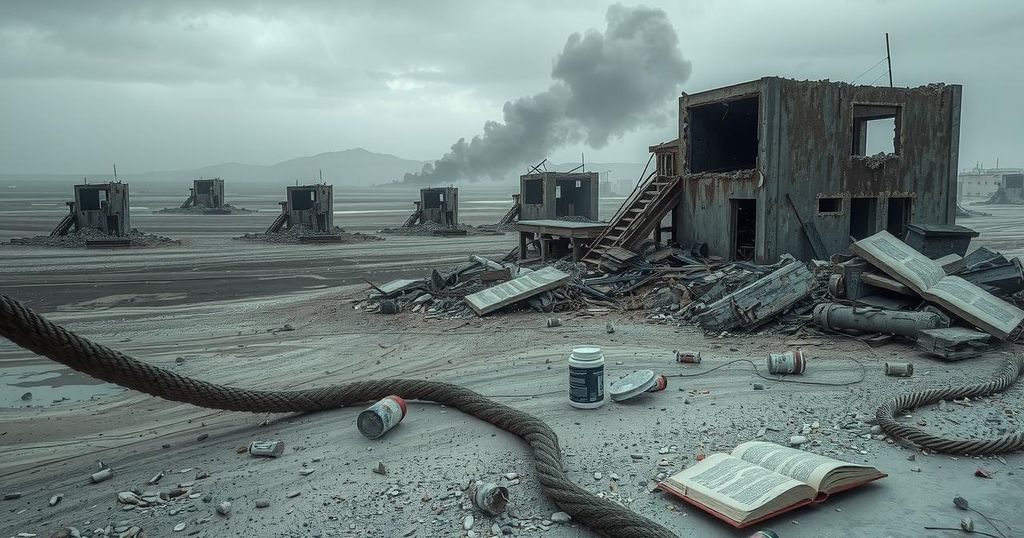The UN report details severe human rights violations during Sudan’s civil war, including arbitrary detentions, torture, and ill-treatment by the Sudanese Armed Forces and the Rapid Support Forces. It highlights the mistreatment of women and children, ethnic discrimination, and enforced disappearances, calling for immediate action and international intervention to address these critical issues.
A recent United Nations report has shed light on severe human rights abuses occurring during the ongoing civil war in Sudan. Published on Thursday, the report details instances of arbitrary detentions, torture, and overall mistreatment faced by detainees in Khartoum State, implicating both the Sudanese Armed Forces (SAF) and the rival Rapid Support Forces (RSF). These findings reflect a disturbing trend of human rights violations throughout various conflict zones in Sudan.
Since the conflict’s escalation nearly two years ago, numerous individuals, including vulnerable groups such as women and children, have been detained arbitrarily. These detainees endure severe limitations on communication with family members and are often held in overcrowded, unsanitary conditions that breach international human rights laws. The report covers the period from April 2023 to June 2024 and draws on testimonies from 34 former detainees, their relatives, and witnesses who have reported harrowing accounts of torture and neglect.
The UN High Commissioner for Human Rights, Volker Turk, expressed grave concern over these practices, stating, “No individual should be deprived of their liberty without due process, nor subjected to torture or other cruel, inhuman or degrading treatment.” In particular, the report highlights the alarming situation of child detainees, some as young as 13 years old, who have been detained alongside adults, and the disturbing revelation that children as young as 14 serve as guards in RSF facilities.
Additionally, the report uncovers incidents of sexual violence against women in RSF-operated detention centers. Ethnic discrimination further compounds these issues, as detainees from the Darfur and Kordofan regions, especially those belonging to African tribes, appear to be targeted disproportionately for torture and mistreatment. Both forces have shown a tendency to select individuals for detention based on perceived affiliations, underscoring a pattern of ethnic profiling.
The report also raises urgent concerns regarding enforced disappearances, noting families’ distress over the lack of information about their detained relatives. One tragic case involves a family systematically warned by RSF personnel against inquiring about a detained member, discovering later that he had died in custody. Though primarily focused on Khartoum, the report indicates that similar abuses have been reported in other conflict-stricken areas, including Darfur and Al-Jazirah State.
Worryingly, the UN has received accounts of detainees being moved from Khartoum’s facilities to remote locations, particularly in South Darfur, which could worsen the human rights situation. Turk emphasized the detrimental effects of these practices, stating, “These practices undermine the rule of law and due process, and increase the risks of further human rights violations.” He urged all parties involved to take immediate action to address these issues.
The UN report advocates for the cessation of arbitrary detentions and torture, improved conditions in detention facilities, and enhanced access to justice. Furthermore, it calls upon the international community to collaborate with Sudanese authorities and armed groups to combat these abuses and strive towards resolving the ongoing humanitarian crisis in the nation. The situation in Sudan remains critical, with continued international calls for immediate resolution of human rights violations amid a seemingly unending conflict.
In summary, the UN report presents alarming evidence of widespread human rights violations in Sudan, highlighting the cruel treatment of detainees by both the Sudanese Armed Forces and the Rapid Support Forces. Key issues include arbitrary detentions, torture, and ethnic discrimination, particularly affecting individuals from marginalized regions. The urgent need for international intervention, reform in detention practices, and protection of vulnerable populations, particularly children, is emphasized as the conflict persists.
Original Source: www.arabnews.com




